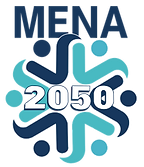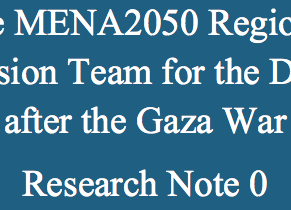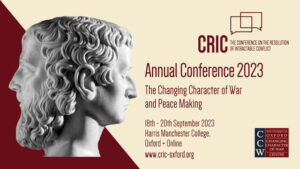An Introductory Note
March 2024
Authors: Omar Al-Ubaydli, Layal Alghoozi, Noora Alozaibi, Arnon Bersson, Noor Elgallal, Ben Grischeff, and Munya Yusuf.
Designers: Karim Al-Nassar, Hayvi Bouzi.
Acknowledgments: We wish to thank Eli Bar-On, Sarah Aweida, and Anissa El Kattani for their support throughout this project. We are especially grateful for the 10 participants who shared their perspectives with us.
Introduction
In February 2024, MENA2050, a homegrown Middle Eastern civil society organization, launched a new initiative known as the Post-Gaza Vision Project. While the proximate cause was an effort to make a constructive contribution to the Gazan war that started in October 2023, the initiative was also consistent with MENA2050’s broader commitment to forging a positive future for the entire region. The MENA2050 Regional Vision Project for the Day after the Gaza War will result in a series of research notes targeting the region’s residents and policymakers. This short note provides readers with background information regarding the MENA2050 and the project, including a description of how the research notes are composed and how the data upon which they depend is gathered.
1. Project Overview
1.1. What is MENA2050?
MENA2050 is a MENA civil society organization that seeks to solve the region’s problems and formulate and implement development projects that allow MENA’s citizens to live better and more dignified lives. It has members from almost every MENA country, including Arab and nonArab states. MENA2050’s key characteristic is its homegrown and panregional status, which distinguishes it from external civil society efforts, or those that are from within the region but have limited membership. It was established in 2021 and receives no government funding.
1.2. What is the MENA2050 Regional Vision Project for the Day after the Gaza War?
Most of MENA2050’s members live in the region, and many live in the countries most acutely affected by the ongoing Gazan War. This has created a strong intrinsic desire to prepare for the day when the War ends by proposing and analyzing projects that could contribute to a lasting and prosperous regional peace. A project team has been assembled for this purpose.
The basic idea of the project is using extensive stakeholder engagement (via interviews) to develop a list of major postcrisis regional reforms that merit consideration by the major powerbrokers in the region’s conflict. The findings will be released in a series of biweekly newsletters (research notes) that report what the research team has learned from the interviews conducted in that period. At the end of the six months allocated to the project, and after conducting approximately 100 interviews and publishing around 10 research notes, a full report will be produced, along with an accompanying policy brief.
MENA2050 happily notes that many organizations are exerting parallel efforts to make post-Gaza visions for the region. The complexity of the problems that the region faces means that many minds need to be put to work in developing solutions, and the value of such efforts is amplified by having a diverse range of stakeholders involved. Nevertheless, it is worth highlighting what distinguishes MENA2050’s efforts: its simultaneously homegrown and inclusive nature, as all ethnicities, religions, confessions, and nations have representation in the project and the organization. While externally-led projects are welcome additions to the collective efforts directed toward the region’s future, homegrown initiatives have to be at the heart of any long-term solution if it is to be legitimate and viable.
The target audience for the research notes and final report is – first and foremost – any MENA resident who wishes to contribute to a more prosperous future for the region. Moreover, we also hope that policymakers, practitioners, and the broader research community will find our output useful. Naturally, given how interconnected the world has become, those from beyond our shores with an interest in the MENA region may also find value in our output.
1.3. What are the Goals?
The headline goals of the Post-Gaza Vision project are as follows.
1. To provide an inclusive forum for the views of homegrown MENA stakeholders regarding the region’s future following the conclusion of the ongoing Gazan War.
2. To develop new, actionable policy proposals using scientific methods.
3. To refine our knowledge of existing policy proposals by exposing them to the scrutiny of local stakeholders in the region. MENA2050 also hopes to build its own capacities as a civil society organization, and to expand the reach of its network.
2. Method
2.1. What Data Will be Collected?
The project will entail collecting two types of data. The first is existing nascent proposals for projects and initiatives for the MENA region that merit consideration by the millions of stakeholders residing in the region. The second is the reflections of stakeholders on those projects and initiatives, including the strengths and weaknesses that the stakeholders associate with the proposals, and the reforms that could potentially improve the proposals should they reach the implementation stage.
2.2. How Will the Data be Collected?
The data will be gathered in two ways. The first is traditional literature searches that span both the academic literature and the research output of think tanks and media outlets, as the latter two are often uncited by academic papers. The conventional suite of web-searching tools will be deployed to this end.
The second is a series of interviews with MENA stakeholders from a wide variety of backgrounds, including: policymakers (current and former), media, researchers, private sector, civil society, international organizations, and others. The interview participants will generally be people from the region residing in the region, but the views of external stakeholders will also be solicited, especially given the geo-strategic importance of the MENA region. This is because the perspectives of those who are not experiencing the region’s conflicts on a daily basis enrich the discussion, and also because developing viable proposals requires an acknowledgement of the region’s relationship with external stakeholders.
The prospective interview participants will be selected by the research team in consultation with the advisory board (see below). Members of the diverse MENA2050 community will feature strongly in those interviews. Prospective interviewees will be solicited to take part in semi-structured interviews, with the initial list of questions being shared with them. Should they agree, almost all interviews will be conducted via video conferencing software.
By default, the interviews will be transcribed and quoted in a manner that maintains participants’ anonymity, in accordance with their right to privacy, and also as a way of motivating them to provide more candid responses to the questions posed. However, should they desire, participants can have their identity explicitly revealed to readers. The transcripts will also be edited to make them more presentable and to tone down potentially inflammatory opinions in a manner that maintains the intended meaning. This is because the project authorship team operate in environments where there exist constraints on the freedom of expression.
2.3. How Will the Data be Presented?
For a period of six months, the project team will produce a research note (newsletter) every two weeks. Each research note will have a theme relating to proposals for the region, with varying degrees of specificity. The first part of the research note will be a background based on the academic literature that provides context for those who may lack familiarity with the issues. The second part of the research note will feature the reflections of approximately 10 interview participants. The concluding part of the research note will be a synthesis of the two data types gathered, allowing for potential disagreement between the members of the research team.
Following the conclusion of the datagathering exercise, a long-form report will be produced that presents the entire dataset, and that synthesizes the findings from the individual research notes, resulting in a set of coherent and specific policy recommendations. A short form of this report will also be produced.
2.4. Who are the Project Team Members?
The project will be led by Omar AlUbaydli. The bulk of the data gathering and analysis will be conducted by the research team, a group of young researchers living inside and outside the region, who have a background in social sciences and an interest in the Middle East. They will be supported by a project coordinator, and a board of over 30 advisors who will facilitate interviews and give feedback on the early drafts of research notes and the concluding report. There will also be a production team that will assist in design, copy-editing, translation, communication, and so on. Below is a brief bio relating to the research team.
Omar Al-Ubaydli is a Bahraini residing in Bahrain. He is the President of the Bahrain Economists Society. He earned his BA in economics from the University of Cambridge, UK; and his MA and PhD in economics from the University of Chicago, USA.
Layal Alghoozi is a Bahraini residing in Bahrain. She is a freelance researcher. She earned her LLB from Newcastle University, UK; and her LLM from the University of Glasgow, UK. Noora Alozaibi is an Emirati residing in the UAE. She is a student at NYU Abu Dhabi, and is expecting to graduate with a BA in political science, social research and public policy in 2024.
Arnon Bersson is an Israeli residing in Israel. He is a researcher at the Israel and Arab Gulf Program at the Abba Eban Institute for Diplomacy and Foreign Relations. He earned his BA in political science and Middle Eastern Studies and his MA in Middle Eastern Studies from Bar Ilan University, Israel. Noor Elgallal is a dual Libyan/UK citizen residing in the UK. She is a student at Leeds University, and is expecting to graduate with a LLB in 2024.
Ben Grischeff is a UK citizen residing in the UK. He is a freelance researcher. He earned his BA in political science and international relations from the University of Cambridge, UK. Munya Yusuf is a Bahraini residing in the US. She is an external affairs intern at the International Institute for Strategic Studies. She earned her BA in international relations and affairs from American University, USA.
Epilogue: What to Expect Next
The project team is targeting the release of the first research note at the end March 2024. It will tackle a general rather than specific proposal: Can the Middle East emulate Europe’s success in using economic integration as a vehicle for peace? If you want to contribute in any way, please reach out to the project leader, Omar AlUbaydli, by email ([email protected]).
We also greatly appreciate your feedback once the research notes begin circulating.



